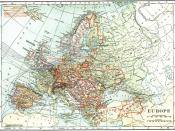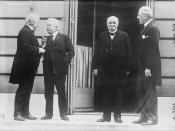The Treaty of Versailles and its effects on Germany
-Disarmament of the Germany army (only 100,000 soldiers and 15,000 sailors were allowed)
-Demolition of heavy weapons
-Demilitarization of the Rheinland (region) and its besiegement
-Germany has to pay reparations: the exact amount should be determined before 1921
-Germany loses the following territories:
o Alsace - Lorraine
o France can make economic use of the Saarland for 15 years
o Eupen-Malmedy (to Belgium)
o North-Schleswig
Who made the Treaty of Versailles
The Council of Five (Britain, the U.S., Italy, Japan and France) wanted to destroy Germany's power in Europe and to make her pay for the costs of war. They wanted peace but Germany was to pay for that peace, not only by reducing its army, reducing its fishing fleet and relinquishing part of its heavy shipping fleet, but also by ceding land, sending coal, livestock, machinery and money to those countries who had suffered by the war.
Germany was pronounced to be the sole aggressor of the war and therefore it was Germany who had to 'pay the bill'.
What was the treaty of Versailles
The most important treaty signed at Versailles was that of 1919. It was the chief among the five peace treaties that terminated World War I. The other four were Saint-Germain, for Austria; Trianon, for Hungary; Neuilly, for Bulgaria; and Sèvres, for Turkey. Signed on June 28, 1919, by Germany on the one hand and by the Allies on the other, the Treaty of Versailles embodied the results of the long and often bitter negotiations of the Paris Peace Conference of 1919.
The outstanding figures in the negotiations leading to the treaty were Woodrow Wilson for the United States, Georges Clemenceau for France, David Lloyd George for England, and Vittorio Emanuele Orlando for Italy-the so-called...



Wel done!
this is a gr8 essay. u explain the asic facts well, it is clear and to the point. However there is no conclusion and i think u could improve the essay by expanding more on the 14 points of Wilson and why the German citezend were shocked that hardly any of his points appeared in the T of V. 1 other point u dont go into enough detail abut Wilson's principle of Self-Determination and his dislike for colonies. a couple of sentences would be fine. but on the whole it was very good with a fair amount of detail. :-) i hope to c more of your histroy essays
3 out of 3 people found this comment useful.